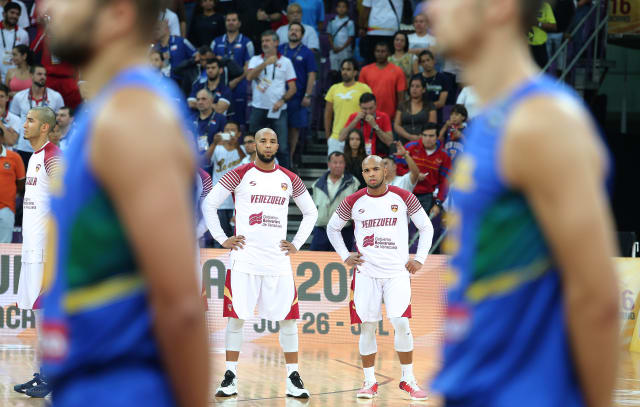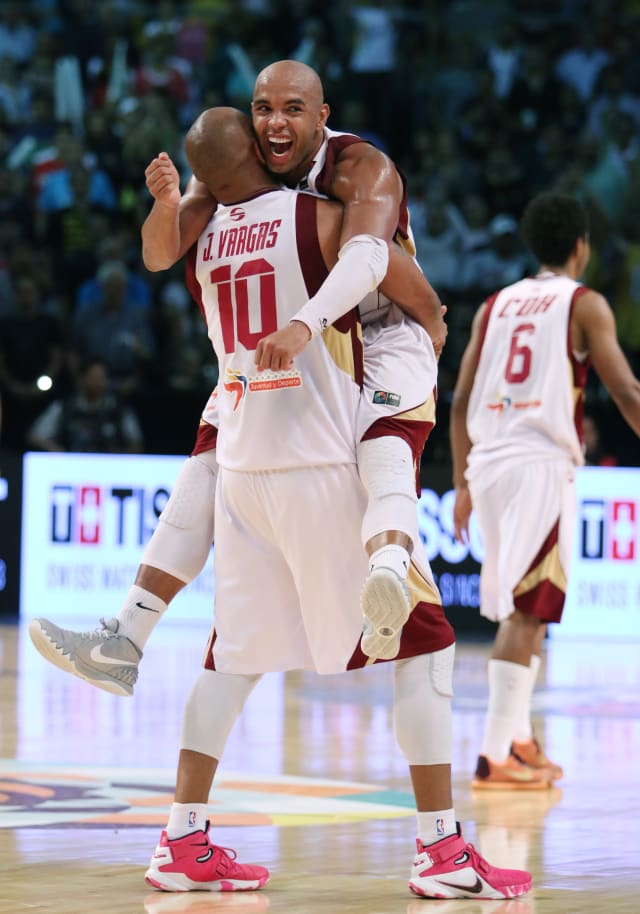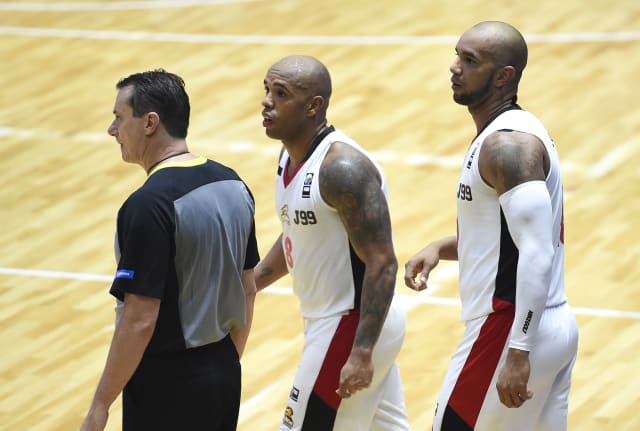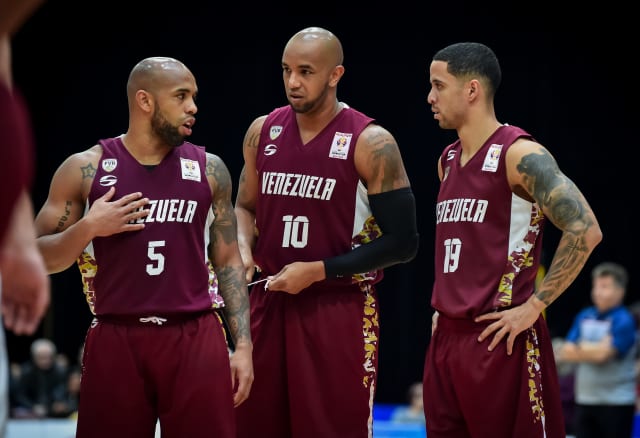Jose and Gregory: the Vargas brothers, not so different
BUENOS AIRES (DIRECTV Liga de las Américas 2019) — Guaros’ last training session in Buenos Aires is over. Luis Bethelmy, Néstor Colmenares and Gregory Vargas are doing push-ups. They request José Vargas to
BUENOS AIRES (DIRECTV Liga de las Américas 2019) — Guaros’ last training session in Buenos Aires is over. Luis Bethelmy, Néstor Colmenares and Gregory Vargas are doing push-ups. They request José Vargas to do the same. Grillito explains he has already done them. His teammates did not see him and acuse him of lying. Whenever a Barquisimeto player throws an air ball, be it in a game or during a training session, they must pay with push-ups. “José didn't do them. No one saw him,” Gregory complains. “I did do them. The trainers were here when I did them,” José defends himself. After this small row between siblings, the Vargas get together to participate in this joint interview.
José Vargas, the oldest brother, was born in 1982. A year later came Yudgredy, and in 1986, little Gregory. “I don't recall much about that moment. I already had a sister, but when I knew that there was a boy on the way I was very happy because I imagined spending a lot of time with him. As he grew, we found out he was a terrible and insufferable boy,” said José. Gregory knows that he was never someone who his family could control: “I was always a very energetic boy, I couldn't stay still, I was always joking around. Really, at 33 I'm still the same. I'm never calm, although I was worse when I was younger. At home none could control me; not my siblings, not my mother. In college it was the same thing, and so was in basketball practice. I was always moving around or bothering someone.”
José, for his part, is calmer and finds an explanation for these differences in personality: “Dad has always been a very calm, silent person. The most exciting thing he would do was getting together on the weekends with his friends. Meanwhile, Mom was always taking care of everyone in the community, of us. She's the one who organizes everything, she's the head of the whole family. I was a very protected child. Because I was such a tranquil child, she was always taking care of me. When I went to play in the national games, she always went with me and Gregory was always the mascot. I'm calmer, but my character is stronger. And I also make my share of pranks.”
The oldest brother's expectation of being able to count on someone to share adventures with became true since the beginning. At El Rodeo neighborhood, in Ocumare del Tuy, Miranda, a union that lasts until today was born. “When we were young, we played everything together. What we liked the most was playing what in Venezuela we call ‘papagayos,’ something like a kite. Sometimes we would do that the whole day until our mom and dad would scold us for spending so much time playing under the sun. With our neighborhood friends we would also play barefooted baseball and soccer, even under the rain. Or sometimes we would get into a small vacant lot to play anything. We had an enjoyable childhood,” said Gregory.
In an athletic family (their parents were both volleyball players, and their sister too), José paved the way for the family's sons. “My beginnings in basketball were in Ocumare del Tuy. I played baseball and a friend invited me to the stadium to try basketball out. That's where I started to practice with children who were two years older than I was, but because I was taller, I could play with no problems. I started to learn the foundations every day with coach Rodolfo García. I liked it and I stayed in this sport,” said the small forward. Meanwhile, the point guard reminisces: “As I saw my brother play, I wanted to follow his steps. When he played baseball, I also wanted to do the same. Then, when he left it for basketball, I followed him. And then the same with the team of the state of Miranda... and finally with the Venezuelan national team. I always saw José as an example. For me, he's the best player because he works so much. Both inside and outside of the court he’s a great person. I would like to gather as many successes as he has.”

The age difference stalled this debut as teammates for 15 years. José remembers it like this: “The first game we played together was in a team from our neighborhood that we called the El Rodeo Jazz. I already played professionally, and Gregory came back from playing with Venezuela's national youth team. We had spent three months without seeing each other and the change was radical. When he left, he was a child and he returned a man. And so, I let him play in the big team and we won our neighborhood's tournament. Professionally, we had to wait until 2012 to be teammates in Marinos, although we had already been together in the national team.” José had debuted in Venezuela’s adult team in the 2007 Olympic Qualifiers in Las Vegas; Gregory, in the 2010 Sudamericano, at Neiva. But the first tournament where they both wore the maroon jersey was in the 2012 Sudamericano, in Resistencia.

18 years after that game where they defended the same colors for the first time, the Vargas brothers are wearing the same Guaros de Lara jersey in the Americas’ highest-level club tournament. And they have already been in the national team together for seven years. “We both know what the other one is capable of doing. We understand each other very well in the court. He's more versatile, he can play forward or guard, but in any position, I know what he can contribute. We always have a good chemistry. We only need to look at each other to communicate. Like this, we anticipate the play, both in the attack and in the defense,” Gregory explains. And José adds: “Despite we play different positions, we have many similar characteristics. Defensively, we both like to be agressive and press a lot. In the attack, Gregory knows when to pass me the ball and I know where to position myself for that pass. Throughout the years we've developed signals to understand each other better.”
The oldest brother also talks about the activities they share when they're not on the paint: “When we're not on the court we share everything. We like to go out and have dinner together. In Buenos Aires we looked for a Venezuelan restaurant to eat dinner with some teammates, just to put our diet aside for a while. We like to go out for a stroll and go shopping.” Gregory contributes a detail about fashion, something that brings them even closer: “We dress similarly, with the same caps, the same shoes, and although there's a four-year difference, we're asked if we're twins.”
Their mutual comprehension and harmonious coexistence end when they face each other in a game. “Sometimes we butt heads because of our character in some basketball or life situations, but we solve the problem at that precise moment,” says José. And Gregory adds: “He always wants what's best for me, so when I get off the right path with my restless behavior, he tries to ground me. We clash during practice sessions, because we're very competitive. In each training session we forget that we're brothers, we start hitting each other and we exchange some harsh words, but we always leave it at that.”
The rivalry that cannot be noticed at the moment is the reason why they were in different teams in the Venezuelan Professional Basketball League. Gregory is still hurting from the most recent event: “The last time we played against each other was in the Venezuelan League final, in 2017. I had come back from Israel to play with Marinos, and José was already with Guaros. We lost the series, 4-2, but the record is balanced.”
As teammates in Guaros, the journey they face together is taking a good route. With six wins they reached the current Liga de las Américas’ Final4 undefeated. Now, they are dreaming about reaching the glory the Barquisimeto team already achieved in 2016 and 2017. “We have the necessary elements to get there. The Players, the technical and directive staff — we're all committed to the same cause. We're training in rhythm and our mindset is already getting ready for what’s ahead for us. We're warriors that know how to play in these instances, and we're already focused on what's coming,” Gregory hopefully says. “Despite what's going on with our League, which hasn’t begun, and our country's problems, we can be champions. We have the experience. We've been improving as games have been going on. The Final4 won’t be easy, there are four teams with a great level of basketball,” José analyzes.

After Liga de las Américas, the brothers will face an even greater objective. The FIBA Basketball World Cup is on everyone's horizon. For the point guard, “going to the World Cup in China will be another dream come true. I’ll have the chance to get to know another country, another culture. I already participated in Olympic Games and now, playing in a World Cup will be a unique experience to top off my career with the national team. I'm already waiting for when the day comes to be there and enjoy it to the fullest.”

The small forward, meanwhile, remembers his previous travel to the East, and warns about the difficulties Venezuela will face in Group A: “I was in China 2007 for the Stankovic Cup. It's a very beautiful country with a completely different culture from ours. Even though we're told that we have an accesible group, it will be very difficult, in my opinion. All teams that are in the World Cup will play good basketball. Poland is a team of a great stature, China have great players and will play at home, and Ivory Coast also have their thing going on. Regardless of all the problems we've faced in our federation and our country, the squad has achieved great things. This participation in the World Cup completes a cycle in which we were South American champions, we won the Americas Tournament and we went to the Olympic Games. I was able to do all of this with my brother and that gives it much more value. We dream about going on to the second round and bring our people joy; they need it in the face of the situation they're going through.”
FIBA